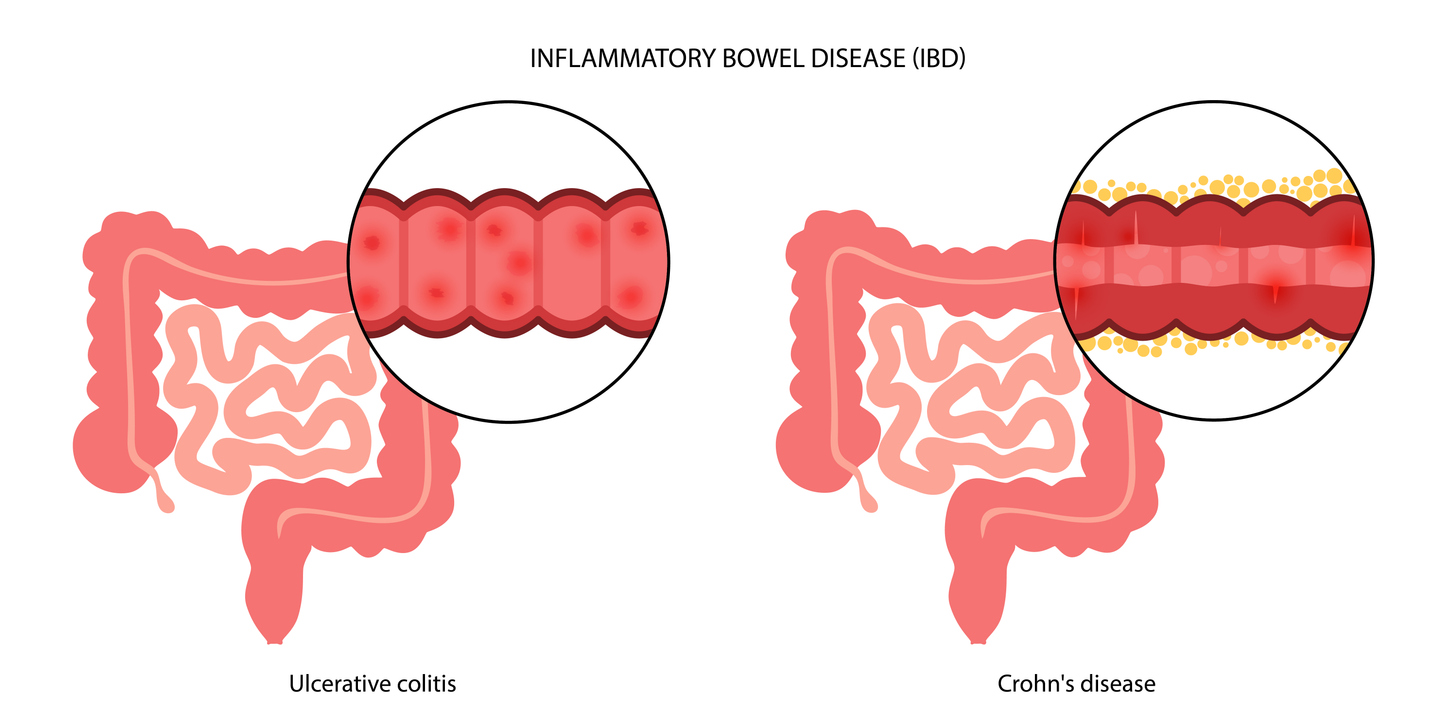
IBD in Children: A Parent’s Guide to Crohn’s Disease and Ulcerative Colitis
When a child experiences persistent abdominal pain, fatigue, or weight loss, it’s natural for parents to be concerned. For some families, these symptoms may eventually lead to a diagnosis of inflammatory bowel disease (IBD), an umbrella term that includes Crohn’s disease and ulcerative colitis. IBD often affects adults, but children and teens can get it, too. Knowing the symptoms, diagnosis, and treatment options is essential to help your child stay healthy.
What Is IBD?
Inflammatory bowel disease refers to chronic inflammation of the gastrointestinal (GI) tract.
The two main types are:
- Crohn’s disease can affect any part of the GI tract. It usually affects the end of the small intestine and the start of the colon.
- Ulcerative colitis mainly affects the colon and rectum. It leads to inflammation and ulcers on the inner lining.
Both conditions have similar symptoms. They need ongoing medical care to manage flare-ups and reduce inflammation.

Why Does IBD Occur in Children?
The cause of IBD isn’t fully known. Experts think it comes from genetic, environmental, and immune system factors. The disease may be triggered in children by an abnormal immune response that causes the body to attack the digestive tract.
Some risk factors can make children more likely to get IBD. These include:
- Family history: Kids with a parent or sibling who has IBD are at a higher risk.
- Ethnicity: IBD is more often found in children of Ashkenazi Jewish descent.
- Environmental exposures: Factors like diet, antibiotic use, and certain infections may contribute to developing or worsening IBD.
IBD isn’t caused by stress or diet alone. However, these factors can worsen symptoms in kids with the disease.
Recognizing the Symptoms of IBD in Children
The symptoms of IBD can vary in severity and location. However, children often have these symptoms:
- Chronic Diarrhea: Frequent loose stools, often with blood or mucus, that can lead to dehydration and bathroom urgency.
- Abdominal Pain and Cramping: Ongoing or recurring stomach pain, often around meals or during flare-ups.
- Unintended Weight Loss and Poor Growth: Difficulty maintaining weight or growing at a typical rate due to poor appetite and nutrient absorption.
- Fatigue and Low Energy: Ongoing tiredness caused by inflammation, poor sleep, or low nutrient levels.
- Delayed Puberty and Developmental Concerns: Slower physical development due to chronic inflammation and nutritional deficiencies.
How is IBD Diagnosed in Children?
Doctors use several methods to diagnose inflammatory bowel disease in children. They check the child’s medical history and conduct a physical exam. Then, they may order lab tests and imaging studies. A pediatric gastroenterologist will start by looking at symptoms and growth patterns. Then, they will order blood tests to check for inflammation, anemia, or nutritional deficiencies. Stool samples may also be analyzed to rule out infections and detect markers of intestinal inflammation.
Doctors often use endoscopy or colonoscopy to confirm a diagnosis. These procedures let them see the digestive tract and take tissue samples (biopsies). Imaging tests like MRI or CT scans can check how much inflammation is present and help rule out other conditions. Early and accurate diagnosis is essential to begin appropriate treatment and support a child’s long-term health.

Treatment Options for Pediatric IBD
Treating inflammatory bowel disease in children requires a complete approach. This helps manage symptoms, reduce inflammation, and support their growth and development.
- Medications: Anti-inflammatory drugs, immune system suppressors, and biologics are commonly used to reduce inflammation, manage flare-ups, and maintain remission.
- Nutritional Support: Specialized diets, nutritional supplements, or enteral feeding may be necessary to address malnutrition, support growth, and improve symptoms.
- Probiotics and Antibiotics: These may be used to manage gut bacteria and prevent infections, helping to restore balance in the digestive system.
- Regular Monitoring and Follow-Up Care: Ongoing checkups with a pediatric gastroenterologist help track disease activity, adjust treatments, and monitor growth, development, and potential medication side effects.
- Surgery: In severe cases where medications do not control the disease, surgical options like removing damaged sections of the bowel may be considered.
Supporting Your Child Emotionally
Living with IBD can be physically and emotionally challenging for children. They might feel anxious, embarrassed, or frustrated. This is especially true if symptoms impact school, sports, or social activities. Parents can help by encouraging open communication, maintaining a routine, working with teachers, school nurses, and counselors to develop a plan that accommodates medical needs, and connecting with support groups. The Crohn’s & Colitis Foundation provides resources and online communities for families with IBD. Mental health support is also important. A therapist or counselor who knows about chronic illness can help children handle their feelings and develop coping skills.

Everyday Management Tips for Parents
Once a treatment plan is in place, managing IBD becomes part of daily life. Help your child take their medicine as prescribed and ensure they attend all follow-up appointments. Help them track symptoms and identify triggers, such as certain foods or stressful situations. A balanced diet, enough hydration, and good sleep help prevent flare-ups. It can also help to keep a symptom diary or use a health-tracking app to monitor progress over time.
Contact Us
If your child has symptoms of inflammatory bowel disease, like stomach pain, diarrhea, or weight loss, get medical help right away. Early diagnosis and proper treatment are key. They can help manage symptoms, support healthy growth, and improve your child’s overall well-being.
At GastroMD, we offer caring, personalized support for kids with Crohn’s disease and ulcerative colitis. Our skilled team understands families’ challenges and works with you to create a treatment plan that meets your child’s unique needs. From diagnosis to long-term management, we’re here to guide you every step of the way. Contact us today to schedule an appointment or learn more about how we can support your child’s digestive health.



